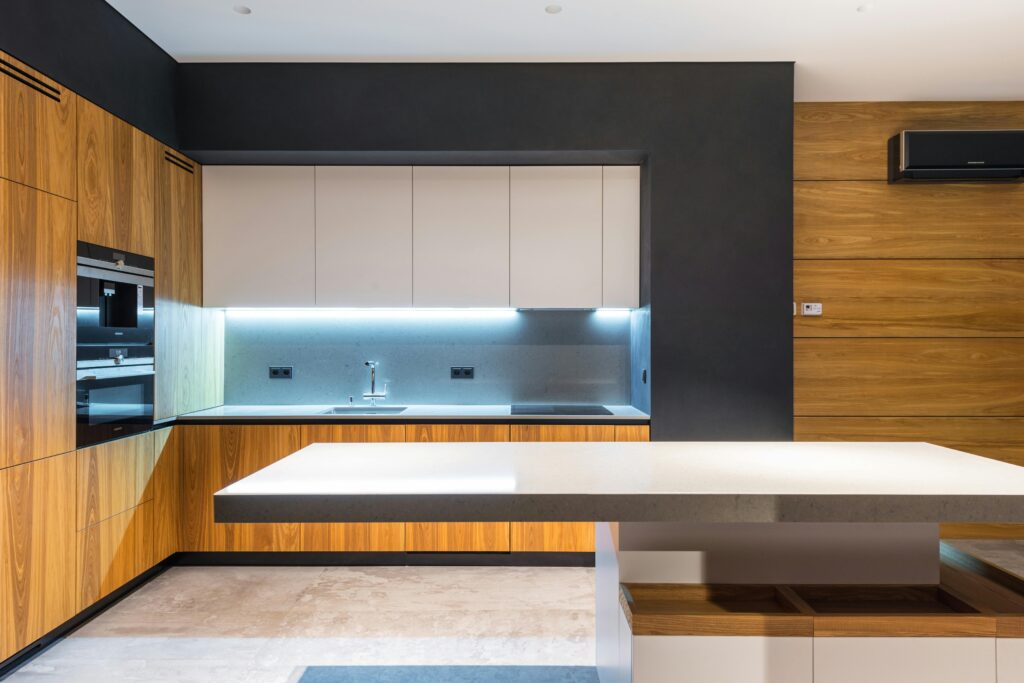The heart of the home is evolving, with sustainability becoming a cornerstone in kitchen design and functionality. This transformation is not just about aesthetics but is deeply rooted in efficiency and environmental consciousness. The kitchen of the future marries smart technology with green principles, offering a glimpse into how culinary spaces can adapt to the changing needs of our planet. Here, we explore the key trends shaping these innovative kitchens, providing inspiration for those looking to renovate or create their dream cooking space.

Intelligent ovens
The oven, including its microwave counterpart, is a staple in daily culinary activities, with modern versions introducing steam cooking to save energy and enhance health benefits. This method preserves more nutrients in food compared to traditional baking or frying. Additionally, many of these advanced ovens come equipped with self-cleaning technologies, eliminating the need for chemical detergents and making maintenance a breeze. For those with the luxury of space, oversized ovens can cook multiple dishes simultaneously, offering another layer of energy conservation.
High-efficiency refrigerators
Selecting a modern, efficient refrigerator significantly reduces energy loss. It’s crucial to accurately gauge your needs to avoid choosing a fridge that’s too large or too small. Furthermore, the type of refrigerator matters: no frost or static cold? No-frost models prevent ice buildup through uniform cold air distribution, while static cold refrigerators, though less technologically advanced, are celebrated for their lower energy consumption.
Avoiding excess
An environmentally conscious kitchen emphasizes quality over quantity, aiming to minimize waste. Investing in high-quality appliances not only proves cost-effective in the long run but also introduces durability into the kitchen. This approach extends to kitchen materials, advocating for the conservation of raw materials and reducing waste.
Choosing raw materials
Current trends lean towards simplicity and the use of raw materials like concrete, wood, marble, and stone, which blend to create a harmonious, authentic look. The appeal of craftsmanship and natural materials is growing, offering a clean aesthetic with a reduced environmental impact. Utilizing reclaimed materials, such as tiles or oak, adds a unique charm and furthers the sustainable ethos.
Recycled materials are also making waves in kitchen design. Recycled glass, for instance, is increasingly used for countertops or backsplash tiles, providing a sustainable and stylish option. Another eco-friendly choice is recycled steel for kitchen furniture, like cabinets or shelves, offering durability, corrosion resistance, and ease of maintenance.
Custom kitchens tailored to you
Your kitchen can and should reflect your personal style and needs. Some kitchen designers are bringing visions to life through virtual reality, allowing clients to immerse themselves in their future space and tailor every detail to their liking. A kitchen that perfectly fits its user, without any unnecessary elements, epitomizes the future kitchen: smart, sustainable, and uniquely yours.
The fusion of smart technology and sustainability in kitchen design is more than a trend; it’s a reflection of a growing consciousness about our impact on the environment and a commitment to making our homes more efficient, healthier, and greener. As we move forward, these innovations in kitchen design set the stage for a future where technology and sustainability go hand in hand, creating spaces that are not only beautiful and functional but also kind to our planet.

 Open Immovlan
Open Immovlan